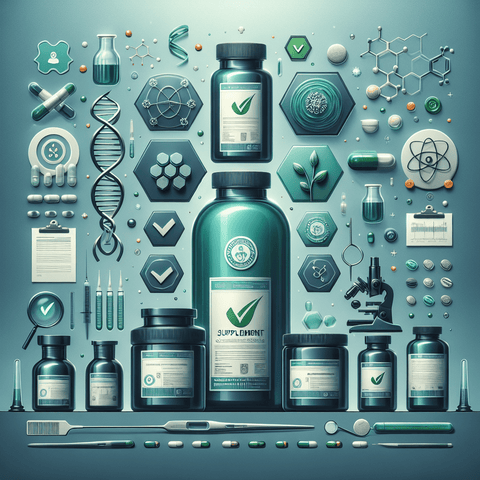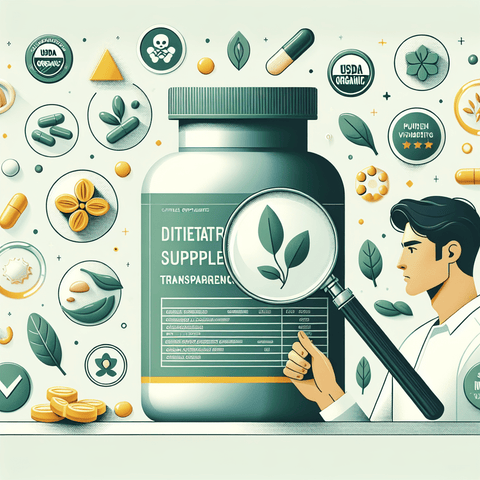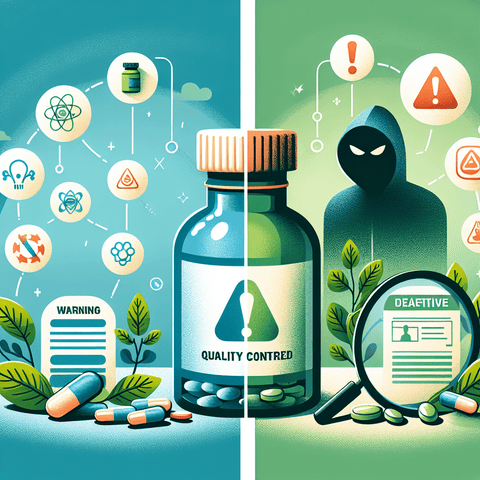Introduction
The global supplement industry has experienced substantial growth over the past decade. With consumers becoming increasingly proactive about their health and well-being, the demand for vitamins, minerals, herbal supplements, and other nutraceuticals has expanded rapidly. In 2024, the global dietary supplements market size is estimated to reach over $170 billion, signaling an ever-growing reliance on these products for health maintenance and nutritional support.
Despite this growth, the supplement industry is not as stringently regulated as pharmaceutical drugs. In many countries, including those in the European Union and the United States, dietary supplements are regulated as food rather than medicine. This means manufacturers are not required to prove safety or effectiveness before their products reach consumers. As a result, the onus of selecting high-quality, safe supplements often falls on the consumer.
This is where certifications come into play. Certifications serve as third-party validations that verify various aspects of a supplement, from ingredient purity and label accuracy to manufacturing practices and absence of contaminants. These certifications can help consumers make informed decisions and reduce the likelihood of purchasing supplements that are ineffective or potentially harmful.
This blog post aims to guide consumers through the landscape of supplement certifications. It will explain what the most recognized certifications mean, why third-party testing matters, and how to identify genuine quality assurance labels. By the end, you’ll be better equipped to evaluate products—such as vitamin C, magnesium, or omega-3 supplements—with a clear understanding of what certifications to look for before making a purchase.
Understanding the Most Trusted Supplement Certifications
Supplement certifications are formal credentials granted by recognized third-party organizations that conduct thorough evaluations of products, manufacturers, and supply chains. These certifications aim to confirm that a dietary supplement complies with quality, safety, ethical, and environmental standards. They are essential markers for distinguishing reputable brands from less transparent ones.
It’s important to distinguish between government regulation and third-party certification. In the EU, for example, supplements must comply with EU Food Supplements Directive (2002/46/EC), while in the U.S., the FDA oversees dietary supplements under the Dietary Supplement Health and Education Act (DSHEA) of 1994. However, these laws generally address safety post-market, meaning that supplements can be sold before proof of efficacy or safety is assessed. This leaves room for discretion regarding quality. Third-party certifications provide an additional layer of protection and credibility.
Here are the most trusted certifications in the supplement industry:
- USP (U.S. Pharmacopeia) Verified: Ensures the product contains the ingredients listed on the label in the declared potency and amounts, does not contain harmful levels of contaminants, and is made according to FDA’s Good Manufacturing Practices (GMP).
- NSF International: Focuses on toxicology, safety, and GMP. Products bearing the NSF mark have undergone testing to verify the accuracy of their contents and to ensure that no undeclared substances are present.
- Informed-Choice / Informed-Sport: Offers assurance specifically for athletes, certifying that supplements are free of substances banned in sports by testing through world-class anti-doping laboratories.
- Non-GMO Project Verified: Confirms that ingredients are not genetically modified. This label is especially important for consumers seeking natural, plant-based supplements such as those found in our vitamin K category.
- USDA Organic: Denotes that ingredients are grown without the use of synthetic pesticides or genetically modified organisms. Supplements bearing this label must have at least 95% certified organic content.
- Certified Vegan and Gluten-Free: These certifications ensure that the product contains no animal-derived ingredients and that it meets defined thresholds to be considered gluten-free. This is essential for individuals with dietary restrictions or celiac disease.
Incorporating supplements with these certifications not only ensures greater health benefits in alignment with EU-authorized claims but also ensures that the products you consume are ethically sourced and made under transparent manufacturing processes. Many reputed brands in the vitamin D and omega-3 fatty acid categories routinely carry one or more of these certifications.
Why Third-Party Tested Supplements Offer Greater Consumer Confidence
Third-party testing is a cornerstone of supplement quality assurance. It involves independent laboratories assessing a product’s composition and verifying that it matches the label claims, is free from contaminants such as heavy metals, and does not contain unnecessary or fraudulent ingredients. This is distinct from internal tests conducted by manufacturers, which may lack transparency and impartiality.
Tests typically review elements such as:
- Purity: Ensuring no foreign or harmful substances are present (e.g., lead, mercury, asbestos).
- Potency: Confirming that active ingredients are present in the amounts stated on the label.
- Microbial Content: Screening for bacteria, yeast, or mold that could affect shelf life or consumer health.
Key independent labs involved in third-party testing include Eurofins, NSF, USP, and ConsumerLab. These entities test random batches of products, adding an essential layer of credibility. Products passing such evaluations often bear symbols or seals on their labeling indicating certification. For example, a USP Verified mark or NSF Certified sign assures consumers that the supplement meets high standards of quality and purity.
According to a 2023 study in the "Journal of Dietary Supplements", over 40% of tested products without third-party seals were found to have discrepancies between their labeled and actual ingredient content. Brands that undergo regular third-party testing instill greater consumer confidence and differentiate themselves as trustworthy in a crowded marketplace.
Third-party tested supplements also address ethical concerns around misleading claims. They preclude scenarios where products are intentionally adulterated or marketed using deceptive practices. When choosing foundational supplements — including magnesium for muscle and bone support or vitamin C for immune function — looking for certifications on the label minimizes your risk as a consumer.
The Role of NSF Certified Supplements in Ensuring Safety and Performance
Founded in 1944, NSF International is a global, independent organization that specializes in standards development and product certification in health and safety. In the context of dietary supplements, NSF provides one of the most stringent quality certification programs available. NSF Certified supplements undergo robust evaluation, from ingredient sourcing to bottling and packaging.
NSF certification includes screening products for banned substances, cross-contaminations, additives, and accuracy of label claims. These tests are not optional; they are conducted continuously and randomly, ensuring consistency across production batches. NSF standards far exceed many baseline governmental regulations and are recognized worldwide, including in the European Union.
One specialized NSF certification—NSF Certified for Sport—is particularly crucial for athletes and fitness professionals. It ensures that a supplement has been tested for 280+ substances banned by most major athletic organizations, including the World Anti-Doping Agency (WADA). Products with this certification are used by elite athletes and sports teams and are frequently chosen by nutritionists advising professional and amateur athletes alike.
Moreover, NSF certified supplements undergo facility audits to verify that manufacturers comply with strict Good Manufacturing Practices. NSF inspectors review employee training records, infrastructure cleanliness, supply chain practices, and process integrity. This yields products of consistently high quality and safety, further supporting efficacy.
Several well-regarded brands offer NSF certified supplements across vitamins, minerals, omega-3s, and herbal categories. If you're purchasing sports-focused products or supplements aimed at optimized performance and recovery, NSF Certified for Sport supplements are a smart, secure choice.
Decoding GMP Supplement Standards: The Foundation of Supplement Manufacturing
GMP stands for Good Manufacturing Practices. These are sets of guidelines that ensure dietary supplements are consistently produced and controlled according to strict quality standards. GMP adherence is not merely a procedural requirement—it acts as the backbone of safe, effective, and reliable supplement production.
In the European Union, GMP is mandatory for pharmaceutical products and strongly recommended for food and dietary supplements. The U.S. FDA has issued its own version of GMP regulations, which cover labeling practices, personnel qualifications, equipment cleanliness, and detailed recordkeeping. Still, many reputable manufacturers voluntarily adopt even stricter GMP standards through certifications like NSF GMP Registered or NPA GMP Certification.
A GMP-certified facility is monitored regularly and must demonstrate controls in virtually every area of production, including:
- Vendor qualification and raw material testing
- Documentation and traceability of batches
- Sanitization of equipment
- Product quarantine, labeling, and recordkeeping
Supplements manufactured in such facilities often bear a GMP logo on their packaging. Choosing products with verified GMP compliance ensures that you're investing in items that are produced under high standards of quality assurance. Whether it’s essential fatty acids from the omega-3 supplement line or foundational minerals like magnesium, GMP adherence indicates responsible manufacturing.
In essence, GMP is a default standard that should be non-negotiable. Even the best formulations can underperform—or even pose risks—if produced in inadequate conditions. Consumers should always check for GMP symbols or statements before purchasing any supplement.
Supplement Quality Assurance: What It Means and Why It Matters
Quality assurance (QA) in the supplement industry refers to the complete system of processes that ensure the incoming raw materials, manufacturing steps, and final products meet specified quality standards. Unlike isolated certificates or quality checks, QA is continuous and comprehensive.
Key QA elements in supplement production include:
- Ingredient Sourcing: Procuring raw materials from trusted and traceable sources, which helps eliminate contamination and false claims.
- Potency and Bioavailability: Ensuring that the supplement delivers an effective dose and is absorbed efficiently by the body.
- Supply Chain Transparency: Ability to trace each ingredient from sourcing to finished product.
Many leading supplement brands now publish Certificates of Analysis (COAs) for consumer review—documents confirming that each batch of product has met established quality criteria. These often include data on active ingredients, impurities, and microbial content. Product descriptions in our vitamin D and vitamin C categories frequently refer to such quality documentation.
Brands that invest in robust QMS (Quality Management Systems) stand out in an increasingly competitive market. Consumers can spot quality-focused companies through transparent branding, willingness to provide technical data, and responsiveness to customer inquiries. Quality assurance also protects against batch-to-batch variation—critical when relying on supplements for long-term health and nutritional management.
Finally, marketplace reputation reflects quality assurance. Independent customer reviews, clinical studies performed on proprietary blends, and partnerships with healthcare professionals also indicate strong QA practices.
Certification for Dietary Supplements: How to Identify Trustworthy Labels
Identifying trustworthy certifications on a supplement label requires a mix of awareness and a little due diligence. Most major certifications have emblematic seals or logos displayed prominently on packaging. Recognizing these logos is the first step toward ensuring you're choosing verified, high-quality products.
However, with the proliferation of new brands and marketing gimmicks, misleading or ‘self-made’ certifications have become more common. These may sound official but are internal labels created by companies to mimic credible certifications. Always vet these claims through official certifier websites. Organizations like NSF, USP, and the Non-GMO Project maintain online databases where you can verify whether a specific product or brand is listed.
When evaluating a label, consider this hierarchy:
- Third-party Testing: Look for USP Verified, NSF Certified, or Informed-Choice seals.
- Manufacturing Practices: Check for GMP certifications specifically from recognized bodies.
- Dietary and Ethical Standards: USDA Organic, Non-GMO Project, Vegan, Halal, or Gluten-Free Certified.
To help consumers make these assessments, below is a checklist:
- Is the supplement manufactured in a GMP-certified facility?
- Is there a valid third-party testing certification visible?
- Are certificates or lab results available online or upon request?
- Is the brand transparent about sourcing and manufacturing?
- Can you verify certification claims through an independent database?
Supplements sold on TopVitamine.com often meet or exceed these criteria, particularly in trusted categories like vitamin K and magnesium. Conducting this level of evaluation protects your health and ensures you're making a well-informed investment in your wellness journey.
Conclusion
Navigating the expansive world of dietary supplements can be overwhelming, particularly in a market where product quality and legitimacy can vary widely. However, by focusing on third-party certifications, manufacturing process standards, and ethical procurement, consumers can make much more informed and confident purchasing decisions. Certifications like USP Verified, NSF Certified for Sport, Non-GMO Project Verified, USDA Organic, and GMP Compliance are all strong indicators of integrity, safety, and product efficacy.
In today’s unregulated supplement landscape, these certifications are often the only defenses consumers have against deceptive labeling, underdosing, and contamination. From ensuring proper ingredient sourcing to proof of microbial purity, each layer of certification plays a part in maintaining supplement integrity. Whether you're adding omega-3s for cardiovascular function or boosting immune resilience with vitamin C, understanding and seeking out proper certifications is a crucial first step in any supplementation plan.
We encourage all customers at TopVitamine.com to consider these certifications seriously and to scrutinize product labels wisely. Always consult your healthcare provider for personalized advice, and never underestimate the value of choosing certified, high-quality nutritional supplements that support your health goals safely and effectively.
Q&A Section
Q: What is the difference between FDA regulation and third-party certification?
A: FDA regulation generally ensures safety after a supplement is available on the market, whereas third-party certifications verify product composition, safety, and labeling accuracy before consumer use.
Q: Why is GMP certification important?
A: GMP certification ensures that a supplement is manufactured under stringent conditions that guarantee consistent quality, safety, and hygiene.
Q: How can I confirm if a supplement is third-party tested?
A: Look for recognized certification seals on the packaging like USP, NSF, or Informed-Sport, or visit the certifying body’s website to cross-reference the product or brand.
Q: Are all supplements with ‘organic’ or ‘non-GMO’ labels certified?
A: Not always. Look for seals from USDA Organic or the Non-GMO Project to ensure the claim has been verified by an accredited third party.
Q: Should athletes choose supplements with specific certifications?
A: Yes, athletes should look for Informed-Sport or NSF Certified for Sport products to ensure they are free of banned substances.
Important Keywords
Supplement certifications, third-party tested supplements, NSF Certified, GMP supplement manufacturing, supplement quality assurance, USDA Organic, Non-GMO Project Verified, USP Verified supplements, Informed-Sport certification, certified vitamins and minerals, nutritional supplement safety, how to choose supplements, omega-3 EPA DHA certification, magnesium supplement quality, vitamin C third-party testing, dietary supplement labels.



